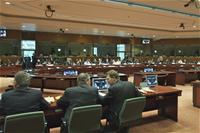Anniversary meeting of the Council of the European Union
Adelina Marini, March 9, 2010
 3 thousand meetings of the Council of the European Union: the anniversary meeting was of the Council of Employment, Social Policy, Health and Consumer Affairs. Probably you have heard many times "today there is a meetings of the General Affairs and External Relations Council, or of ECOFIN, or of the Transport ministers, etc". But, probably, you have hardly paid attention what these meetings actually mean.
3 thousand meetings of the Council of the European Union: the anniversary meeting was of the Council of Employment, Social Policy, Health and Consumer Affairs. Probably you have heard many times "today there is a meetings of the General Affairs and External Relations Council, or of ECOFIN, or of the Transport ministers, etc". But, probably, you have hardly paid attention what these meetings actually mean.
But what exactly are those Councils? Their basic function is policy-making, notably in foreign affairs matters, and coordinating functions, notably in economic matters. A representative of each member state takes part in the Councils, empowered to vote on behalf of the national government on most issues.
In other words - if the European Commission is something like a relatively not complete form of a European government, the Council is the place where respective ministers of member states approve Commission's proposals or make new legislation.
For example, on Monday EU ministers of social policy and labour agreed on a directive aimed at achieving the safest possible working environment for healthcare workers. When this directive would enter into force, it will be harmonised with national legislation and be applied in member states. The Councils usually discuss certain issues in details, for example: "Injuries caused by needles and other sharp instruments are one of the most common and serious risks to healthcare workers in Europe and represent a high cost for health systems and society in general", as part of the conclusions from the Council yesterday say.
A little background which can help us see since when solutions are being agreed on a European level, which we afterwords apply on national level. The current numbering of the Council meetings dates back to July 1st 1967 when a single Council and a single Commission have been established. Before that date some 460 meetings of the Council of the European Coal and Steel Community, since 1952, and of the Councils of the European Economic Community and of the European Atomic Energy Community, since 1958, had already been held.
The Council meets in ten different configurations: General Affairs; Foreign Affairs; Economic and Financial Affairs (ECOFIN); Justice and Home Affairs (JHA);
Agriculture and Fisheries; Employment, Social Policy, Health and Consumer Affairs;
Competitiveness (Internal Market, Industry and Research); Transport, Telecommunications and Energy; Environment; and Education, Youth and Culture.
Before the Lisbon Treaty's entry into force on December 1st 2009, the General Affairs and External Relations Council was a single configuration. Now, when we already have a High Representative for Foreign Affairs - baroness Catherine Ashton - the Council has been divided in two: foreign relations, presided by her and General Affairs, presided by the foreign minister of the country, holding the rotating presidency (currently Spain).
The meetings of the Councils of General Affairs, foreign relations, ECOFIN, Agriculture and Fisheries are held on a monthly basis. Other Council configurations meet from one to three times per semester. Another interesting fact from European structure is that the venue of most Councils is in Brussels, excluding the months April, June and October when the venue is Luxembourg. The frequency of the meetings depends on the type of the Council because not all issues can be solved on a European level. For example education is a national priority and the education ministers meet rarely only to coordinate more European issues like diplomas.
As we can see, the process of decision-making in EU is difficult and complex. And as European politicians say quite often - this process is based upon compromise. Compromises though, sometimes lead to failures as with the Greek case and, most probably, the series would be continued with Spain, Ireland and Portugal.
Nevertheless and no matter how difficult, progress is being achieved. Now we can enjoy cheaper mobile phone prices in the entire EU which makes it even easier travelling within the Union. We have no visas, we do not stop for customs and border checks (excluding the countries outside the Schengen area), we can return goods which we don't like and so many other things of our everyday lives, which are the result of those long and quite often boring 3,000 meetings of generations of ministers. Generations who lived through the times of th Cold War, the fall of the Berlin Wall until nowadays.
 Federica Mogherini | © Council of the EU
Federica Mogherini | © Council of the EU | © Council of the EU
| © Council of the EU Luis De Guindos | © Council of the EU
Luis De Guindos | © Council of the EU